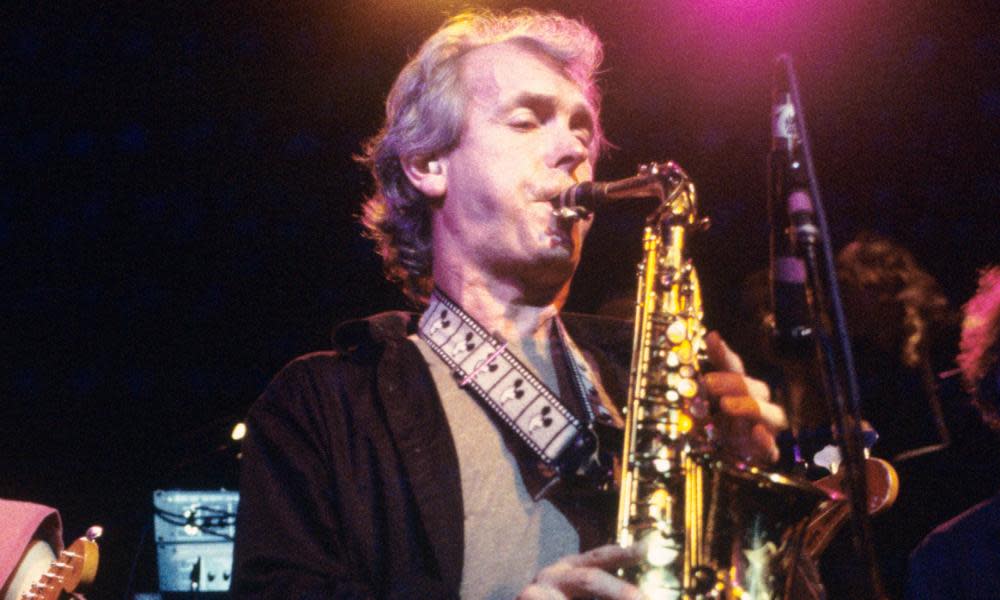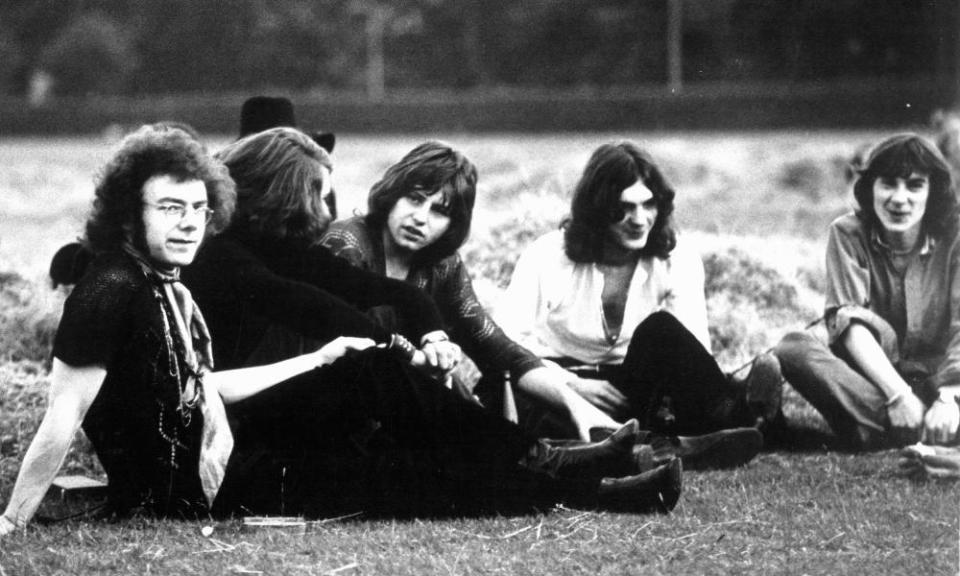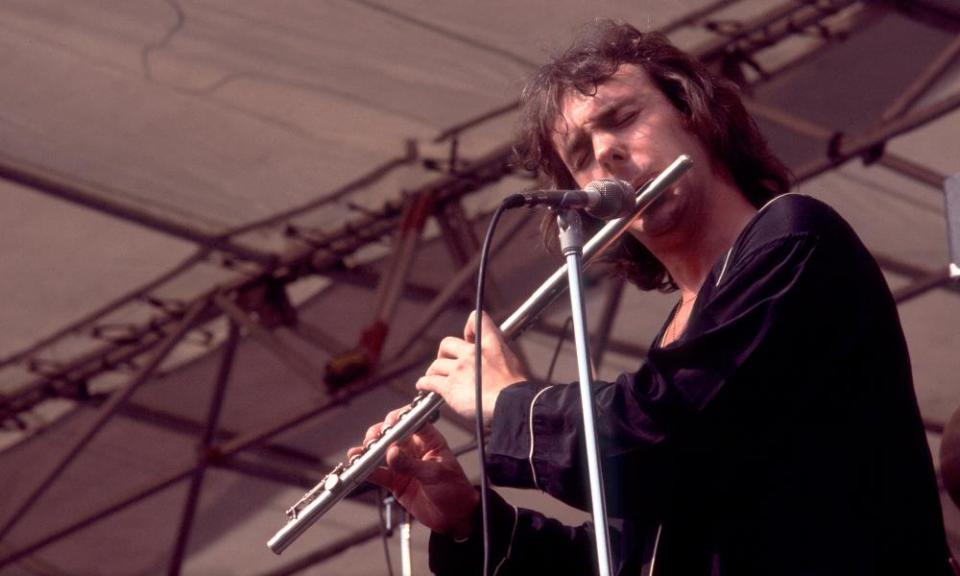Ian McDonald obituary

Multi-instrumentalist and galvanising force of Foreigner and King Crimson, who also played saxophone on T Rex’s Get It On
Even in a year outrageously overloaded with some of the most celebrated albums in rock history – the Who’s Tommy, Blind Faith, the Stones’ Let It Bleed, the Beatles’ Abbey Road, Led Zeppelin II and many more – In the Court of the Crimson King was hailed as a phenomenon. Released on Island Records in October 1969, King Crimson’s debut album was a boldly panoramic mix of hard rock, epic balladry, mystical acoustic atmospherics and squealing free jazz. As the prog-rock historian Paul Stump postulated: “If progressive rock as a discrete genre can be said to have had a starting point, In the Court of the Crimson King is probably it.”
The guitarist Robert Fripp became the band’s best-known member, but the multi-instrumentalist Ian McDonald, who has died from cancer aged 75, was a galvanising force in the group’s potent mix. He was co-writer on all the album’s tracks, and his fiery saxophone soloing was a highlight of the album’s opening track, 21st Century Schizoid Man. The song’s rampaging middle section was essentially a piece called Three Score and Four, which he had composed for the army band he had played with during his military service. “That whole section is mine that I lifted from that score that I had written,” he said.
It was also at McDonald’s urging that King Crimson acquired a Mellotron sampling keyboard, able to play different sounds assigned to its various keys. This became integral to King Crimson’s sound, not least on the album’s 10-minute title track (it originally had a country and western-style tune written by Pete Sinfield, but McDonald replaced it with his own awesome melodic creation). Despite the group’s dark and heavy image, McDonald insisted: “It was fun! It was done with a tremendous amount of humour.”

Crimson’s dramatic debut had been preceded by their support slot at the Rolling Stones’ Hyde Park concert in July 1969 in front of a 500,000-strong crowd, where McDonald’s saxophone solo in 21st Century Schizoid Man earned him a standing ovation, and when they toured the US later in the year they rode in on a wave of critical approbation. However, McDonald and the drummer Michael Giles felt unhappy with the group’s increasingly experimental leanings, and left in December 1969. The pair released the album McDonald and Giles (1970), then subsequently split up.
McDonald played on a variety of sessions, most notably adding baritone sax to T Rex’s UK chart-topper Get It On (1971). He also did some production work with Darryl Way’s Wolf and played sax on a couple of tracks on King Crimson’s album Red (1974). In 1975 he produced Modern Masquerades by the Irish progressivists Fruupp as well as Fireballet’s Night On Bald Mountain.
Then the big time came knocking again. McDonald had moved to New York, and in 1976 he was recruited by another British expat, Mick Jones, to join his new band Foreigner. Their debut album appeared the following year, sold five million copies in the US alone, and generated a trio of big hit singles, Feels Like the First Time, Cold as Ice and Long, Long Way from Home, McDonald being co-writer on the last of these. The band rapidly ballooned into one of the biggest acts of the era, hurtling to No 3 on the US chart with their second album, Double Vision (1978), another multi-million seller which produced big hits with Hot Blooded and its title track.

In June 1978, McDonald found himself on a bill with the Stones again when Foreigner opened for them at Philadelphia’s JFK Stadium. Head Games (1979), like its two predecessors co-produced by McDonald, went to US No 5, and scored Top 20 hits with the title song and Dirty White Boy. However, Jones now decided that the band needed to overhaul its musical direction and sacked McDonald and another original member, Al Greenwood. “Mick wanted to pare the group down to a four-piece, so that’s what happened,” McDonald observed. “I didn’t make the cut.”
He was born in Osterley, Middlesex, into a musical family which encouraged his interest in a range of styles, from classical to jazz and rock’n’roll. He taught himself the guitar, then later moved on to woodwind instruments including the flute and saxophone. He spent five years in the British Army, where he played the clarinet in a military band. As he said in a 2019 interview with the online Paste magazine: “I just loved well-written, well-played and intelligent music, and hopefully a little bit rubbed off.” He added that he made a point of listening to a Steely Dan album every day.
After leaving the army he moved to London, and one of his early musical partners was the vocalist Judy Dyble, later of Fairport Convention. He then joined forces with Fripp, Michael Giles and Giles’s bass-playing brother Peter, who were calling themselves Giles, Giles and Fripp, though disagreement over their musical direction prompted them to split in mid-1968. With the addition of Sinfield and the bassist/vocalist Greg Lake, and the subtraction of Peter Giles, the original King Crimson was formed later that year.
‘I just loved well-written, well-played and intelligent music.’ He made a point of listening to a Steely Dan album every day
In 1996 McDonald played on the former Genesis guitarist Steve Hackett’s Genesis Revisited album and also toured with him, in concerts which included a version of In the Court of the Crimson King. In the same year, McDonald played the flute on Nothing Is Easy, from the Jethro Tull tribute album To Cry You a Song – A Collection of Tull Tales.
In 2002 he joined various King Crimson veterans in 21st Century Schizoid Band, who played material from Crimson’s early albums, and in 2009 McDonald and Fripp both appeared on Dyble’s album Talking With Strangers. He released the solo albums Drivers Eyes (1999) and Take Five Steps (2019). With the band Honey West, featuring McDonald alongside the musician and actor Ted Zurkowski and with his son Maxwell McDonald on bass, he recorded Bad Old World (2017). He appeared with Foreigner for several 40th anniversary shows in 2017.
He features in Toby Amies’s new documentary In the Court of the Crimson King, which traces the history of King Crimson and will premier at the SXSW film festival in March 2022.
• Ian McDonald, musician, composer and producer, born 25 June 1946; died 9 February 2022

 Yahoo News
Yahoo News 
